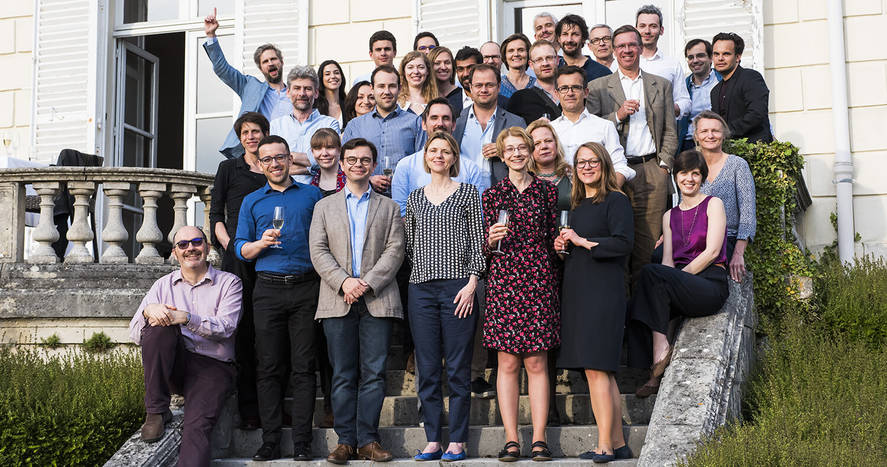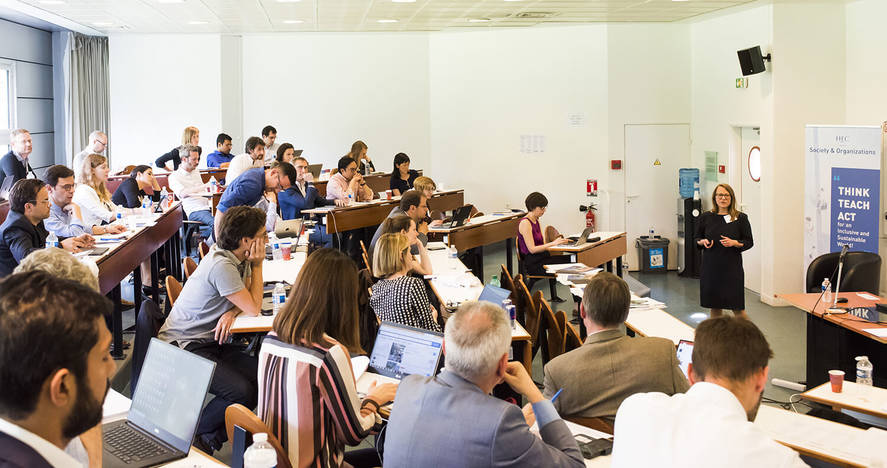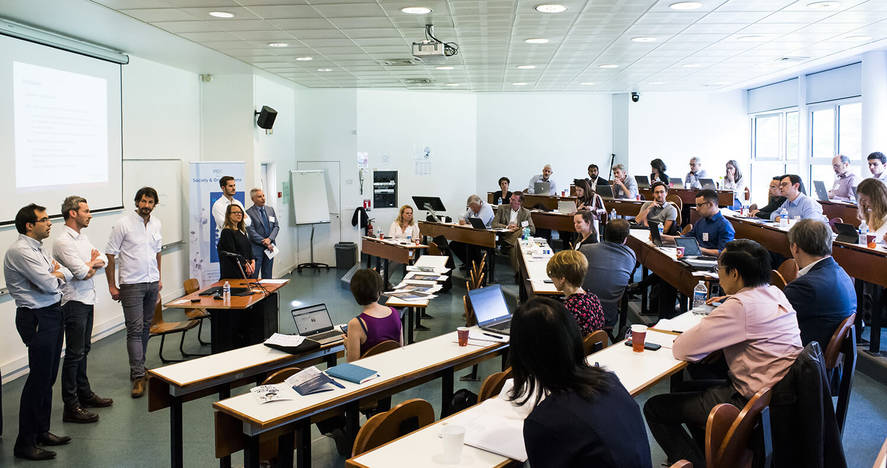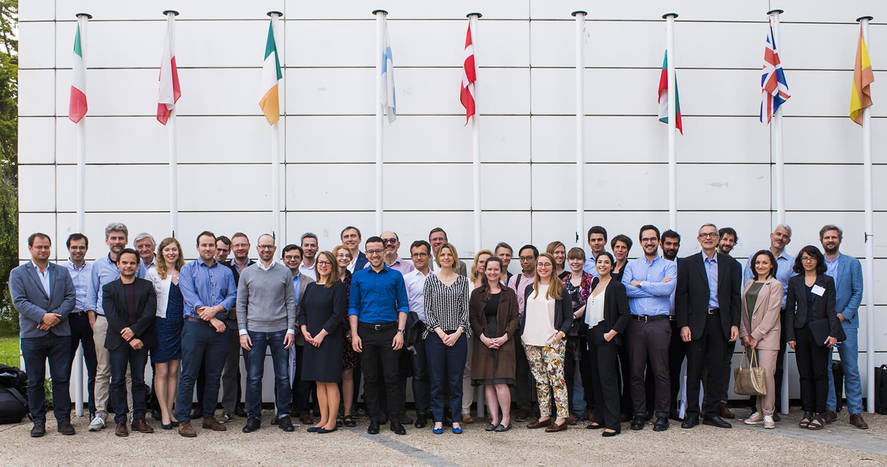Frank Debates Over Cutting-edge Research at S&O
The fifth S&O Research Day featured 21 presentations and three keynote speeches in a whirlwind exchange over two days. Organized by HEC Professor Georg Wernicke, the May 23-24 event was notable for its diversity, high-powered insights and motivation.
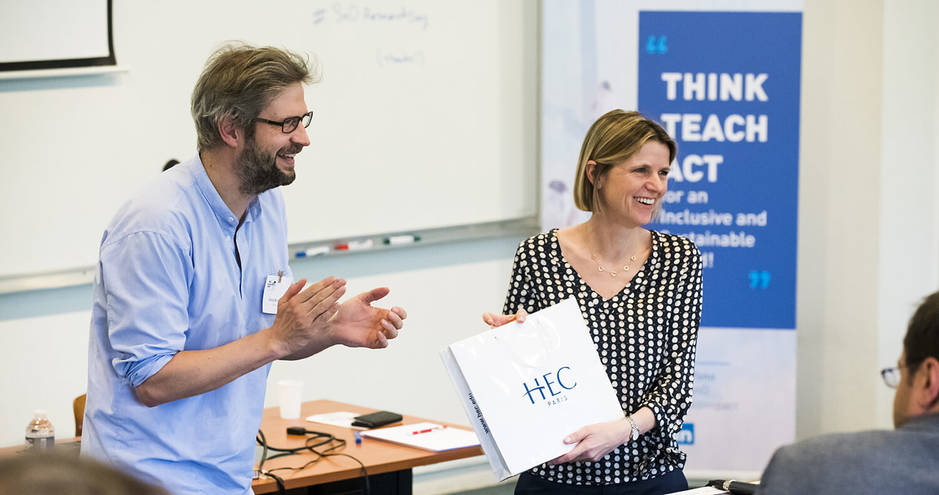
Sparks flew in the Jouy campus amphitheater T303 as top academics compressed their ongoing research into an eight-minute format they scrupulously respected. It was a delicate exercise and resulted in crisp presentations of works that were often inter-disciplinary depictions of societal transformation. "The format is crazy !" admitted HEC Assistant Professor Marieke Huysentruyt with a smile. She spoke shortly after her dynamic presentation of a joint research project (alongside doctoral student Anicet Fangwa) on primary health centers in the Democratic Republic of Congo. "But this exercise is salutary, it forces us to address the vital points in our work and steers away from over-specialized vocabulary."
"Less is sometimes more," added Huysentruyt’s colleague, Georg Wernicke, who took time off his own research (situated at the intersection of CSR and the drivers of public disapproval of firms’ practices) to organize this annual event. “We encourage academics to present the vital, unique features of their research in a nutshell. So they distill their papers into four slides instead of 20, for example. Naturally, for those who want to prolong the presentation, there are plenty of breaks to further discuss it.”
External Input
On top of the 21 presentations, external discussants pored over the papers and brought their own trenchant analyses and suggestions to the fore. “Sifting through 324 pages making up four papers was quite a challenge,” commented Wharton School academic Witold Henisz, “but I was impressed by the diversity of the research streams.” The professor of management was blunt in his feedback on the research presented. This was a general feature of the conference and did not surprise fellow-discussant Magali Delmas. “Oh, you know, us researchers are criticized all the time,” confided the professor from UCLA’s Anderson School of Management. “It’s just part of the trade. It takes years to publish an article, we regularly go back to the drawing board to improve our work. That’s why our methodology is rigorous: we’ve had so much feedback, often negative, sometimes positive.”
Publishing research represents the very heartbeat of an academic’s professional life, according to the third discussant, Davide Ravasi. “Yet this vital process of research is never talked about, it’s not written anywhere.” At the conference, this UCL specialist in history, identity and memory in organizations thus decided to present a keynote speech on how to persuade reviewers to accept a research paper. “When you send your paper, you have to ask yourself: what are the ingredients of novelty, significance and relevancy in your research?” he suggested to the participants. After his presentation, he elaborated: “My talk was essentially aimed at young researchers of qualitative case studies that are struggling – as I did for years – with this delicate step of their research. But you can extrapolate to all researchers who must answer these basic questions. We must find links between our research and the broader impact on society.”
Multi-disciplinary and Transversal
Magali Delmas insisted on this outreach approach: “It’s so important to gather here as scholars and go beyond our ivory towers into more action-oriented research.” She called on her fellow-academics to collaborate with businesses and experiment with solutions to the “incredible challenges” society faces: “Climate change and economic inequalities, to name but two.” She added: “Business is part of the problem, for sure. But it’s also part of the solution. So, how can we researchers help corporations innovate, how can we influence their policies? My answer is to become more involved with them through experimental research.”
The multi-disciplinary nature of the research and the diversity of topics covered at this fifth Research Day made it challenging to find a common thread coursing through all 21 presentations. They ranged from measurement tools for performance to gauging the impact of digital and AI innovations in industry, and to assessing the evolution of the composition and behavior of top management. “I believe everyone benefited from the diversity of topics covered, the different schools of thought and methods being used to carry out all this research,” said Georg Wernicke. The 50 people who attended the two-day event represented a broad cross-section of HEC students and academics, all happy to listen, challenge and mingle in frank and informal exchanges. “This is a very important conference for HEC Paris,” underlined Christophe Perignon, the school’s Associate Dean for Research. “It brings together the notions ‘Think, Teach Act’, the three pillars of S&O’s objectives. Long may it last.”
Read also: "Q&A with Witold Henisz: Exploiting Big Data for a Financial Revolution"
